The staff at Vogue Recovery Center was more than accommodating and made me feel very taken care of, they worked hard to meet my every need, and were extremely patient with me during my recovery process. My life was transformed at this place, and I had the opportunity to reco ...
About Vogue Recovery Center
The center uses traditional evidence based therapies but also incorporates alternative therapies. They’re an inclusive center, welcoming LGBTQIA clients. They also treat pregnant clients. If you’re a first responder or a veteran, they have a specialized program, Valor, for you. This is a trauma informed program.
They work with most major insurance providers to help you get your treatment covered. They also accept TRICARE. They can help you navigate Medicare and Medicaid as well.
If you need short or long term medical detox, the facility has both. They have onsite staff administering medications to get you through the detox process with the fewest possible negative side effects. Most people go from detox to their residential treatment program.
The residential program in Arizona offers you a safe place surrounded by peers where you can work on your alcohol and substance use recovery. At the same time, you’ll be in a structured environment to minimize triggers.
You’ll attend daytime treatment programs and see doctors and therapists. You’ll address your substance use while also dealing with any co-occurring mental health disorders like anxiety, bipolar disorder, or depression. Some therapies may include cognitive behavioral therapy (CBT) and eye movement desensitization and reprocessing (EMDR). In residential treatment, you’ll share a room and bathroom with only one other person.
You’ll have the option to attend yoga, participate in outdoor adventure therapy, and holistic groups like mindfulness and art therapy. Your evenings include support groups such as AA, free time, and social activities. Residential treatment is usually about 28 days.
You’ll have a comprehensive aftercare plan when you leave residential treatment. This may include transitioning to a partial hospitalization program (PHP) or an intensive outpatient program (IOP). Both programs offer further psychiatry appointments and therapy.
One former client noted that the facility was very clean and the staff really cares for their patients.
Latest Reviews
Rehab Score
Gallery
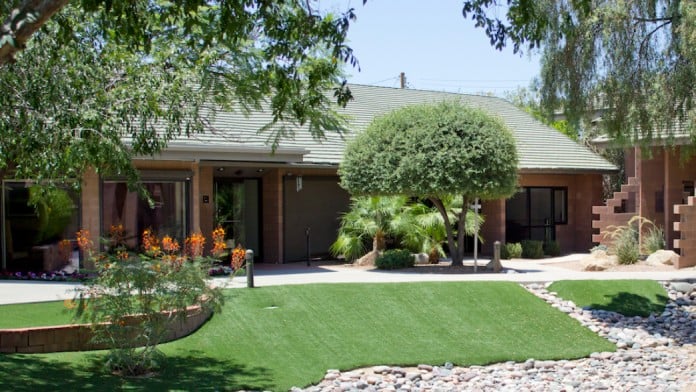
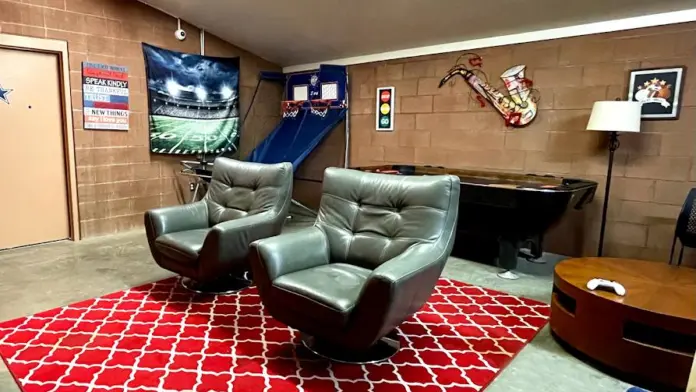
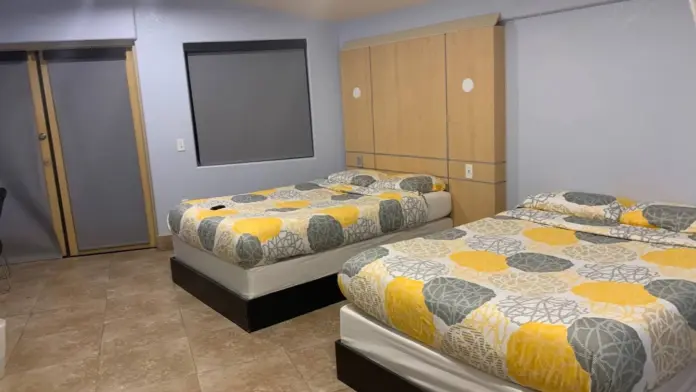
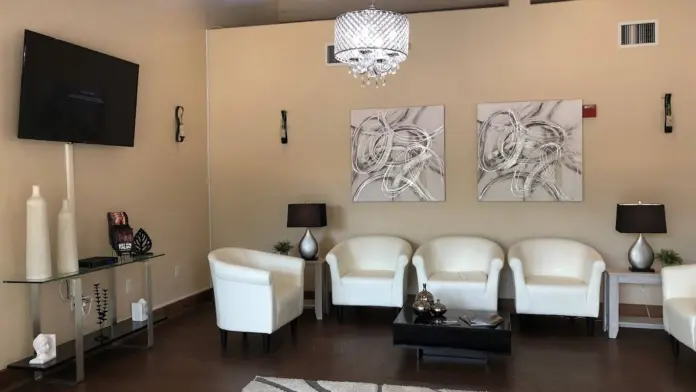
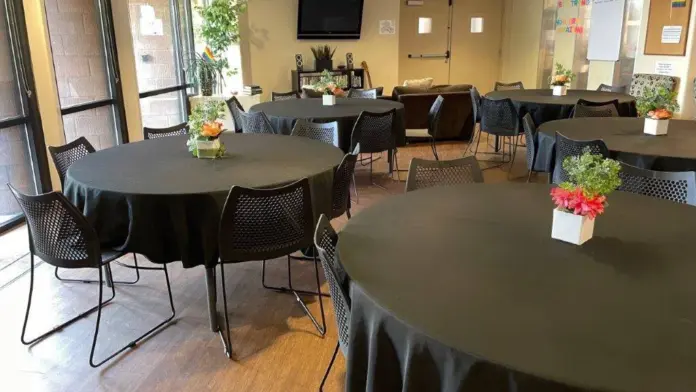
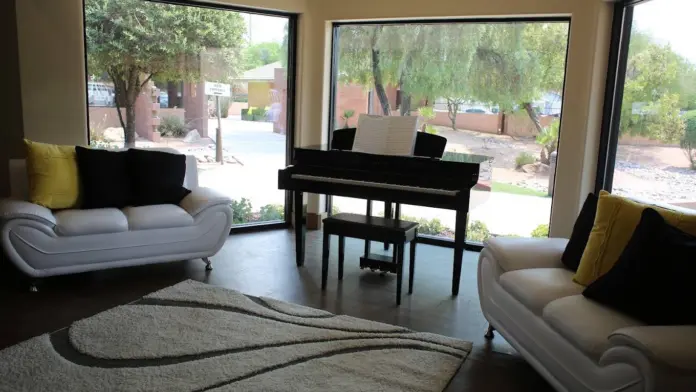

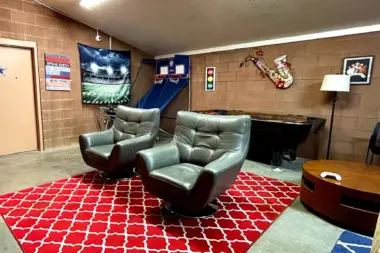
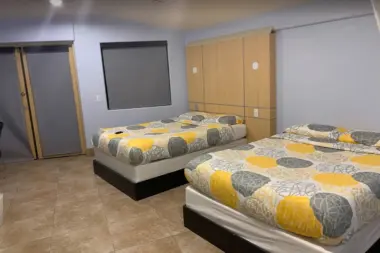
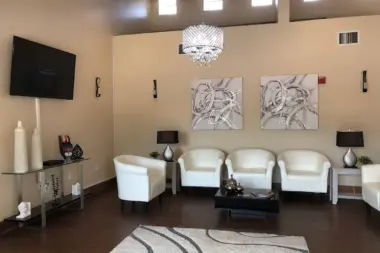
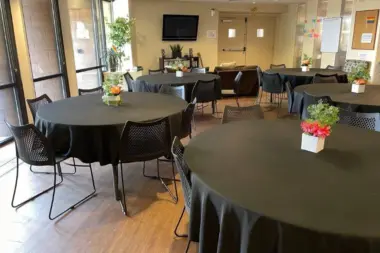
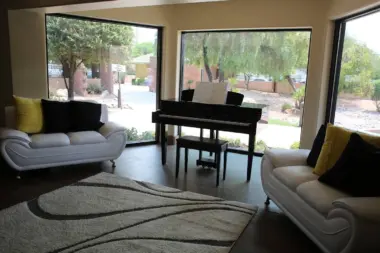
Accepted Insurance
Other Forms of Payment
Private insurance refers to any kind of healthcare coverage that isn't from the state or federal government. This includes individual and family plans offered by an employer or purchased from the Insurance Marketplace. Every plan will have different requirements and out of pocket costs so be sure to get the full details before you start treatment.
Self-pay involves paying for treatment out of your own pocket. You can use savings or credit, get a personal loan, or receive help from family and friends to fund your treatment. If you don't have insurance or your insurance plan doesn't cover a specific program, self-pay can help ensure you still get the care you need.
Military members, veterans, and eligible dependents have access to specific insurance programs that help them get the care they need. TRICARE and VA insurance can help you access low cost or no cost addiction and mental health treatment. Programs that accept military insurance often have targeted treatment focused on the unique challenges military members, veterans, and their families face.
Private insurance refers to any kind of healthcare coverage that isn't from the state or federal government. This includes individual and family plans offered by an employer or purchased from the Insurance Marketplace. Every plan will have different requirements and out of pocket costs so be sure to get the full details before you start treatment.
Addiction Treatments
Levels of Care
Treatments
Programs
Adult rehab programs include therapies tailored to each client's specific needs, goals, and recovery progress. They are tailored to the specific challenges adult clients may face, including family and work pressures and commitments. From inpatient and residential treatment to various levels of outpatient services, there are many options available. Some facilities also help adults work through co-occurring conditions, like anxiety, that can accompany addiction.
Young adulthood can be an exciting, yet difficult, time of transition. Individuals in their late teens to mid-20s face unique stressors related to school, jobs, families, and social circles, which can lead to a rise in substance use. Rehab centers with dedicated young adult programs will include activities and amenities that cater to this age group, with an emphasis on specialized counseling, peer socialization, and ongoing aftercare.
Recovery is most successful when clients feel accepted and validated by their peers and treatment providers. Facilities that offer LGBTQ-inclusive programming are committed to creating a safe space where everyone can grow and recover without fear of judgment or discrimination. They will have dedicated policies in place to create a safe and supportive environment that fosters free expression.
Clinical Services
Amenities
-
Gym
-
Yoga Studio
-
Wifi
-
Residential Setting
-
Private Rooms
-
Meditation Room
-
Recreation Room
-
Walking Trails
Staff & Accreditations
Staff

James Miller
Director of Admission

Kelsey Jones, MS, MPC
Executive Director
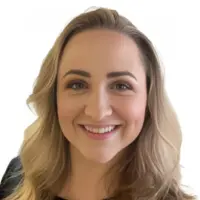
Vaun Williams, LPC
Chief Medical Officer

William Wilder, BSW
Chief Marketing Officer
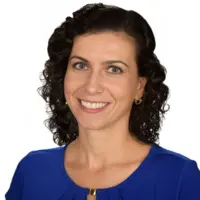
Janice Vaysberg, MBA
Chief Financial Officer
Accreditations

The Substance Abuse and Mental Health Services Administration (SAMHSA) is a branch of the U.S. Department of Health and Human Services. Established in 1992 by congress, SAMHSA's mission is to reduce the impact of substance abuse and mental illness on American's communities.
SAMHSA Listed: Yes

The Commission on Accreditation of Rehabilitation Facilities (CARF) is a non-profit organization that specifically accredits rehab organizations. Founded in 1966, CARF's, mission is to help service providers like rehab facilities maintain high standards of care.
CARF Accreditation: Yes

State Licenses are permits issued by government agencies that allow rehab organizations to conduct business legally within a certain geographical area. Typically, the kind of program a rehab facility offers, along with its physical location, determines which licenses are required to operate legally.
State License: Arizona
License Number: BH5357

The Joint Commission, formerly known as JCAHO, is a nonprofit organization that accredits rehab organizations and programs. Founded in 1951, the Joint Commision's mission is to improve the quality of patient care and demonstrating the quality of patient care.
Joint Commission Accreditation: Yes
Accreditation Number: 605112
Contact Information
4122 North 17th Street
Phoenix, AZ 85016





